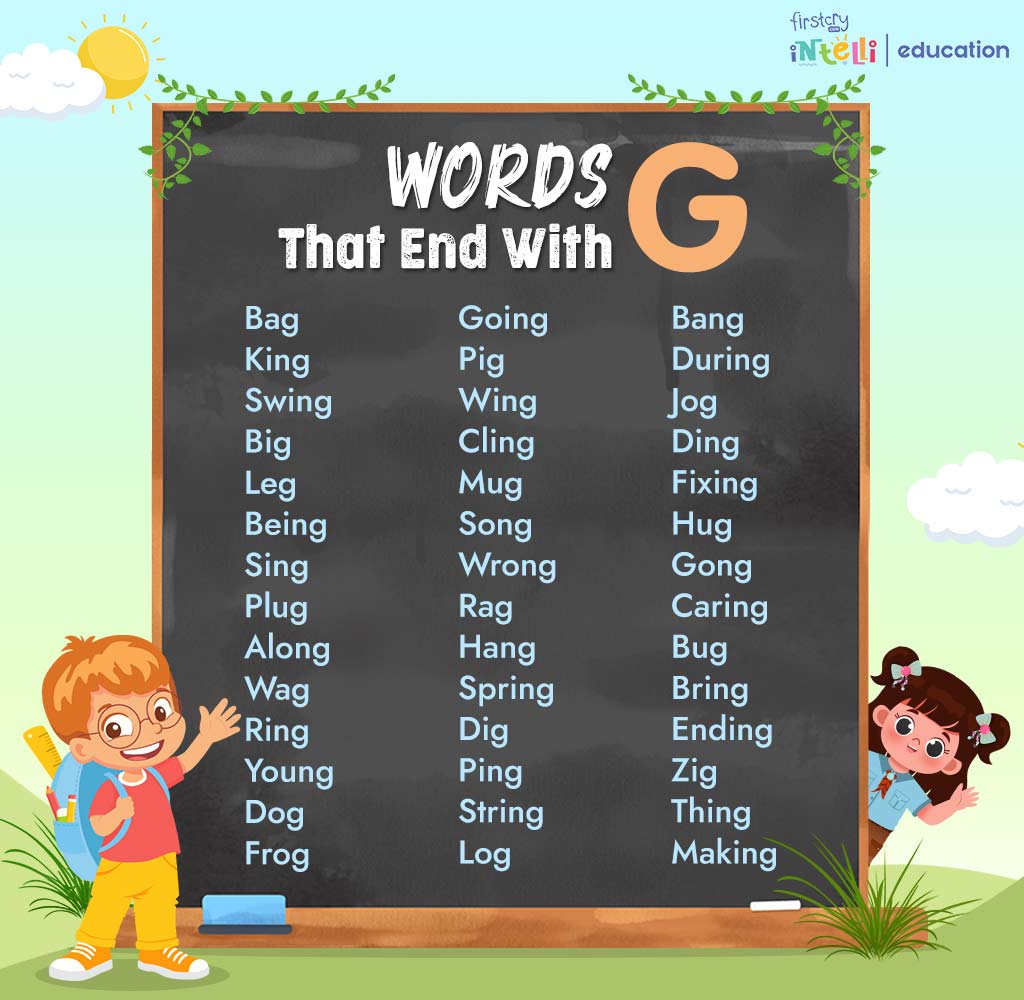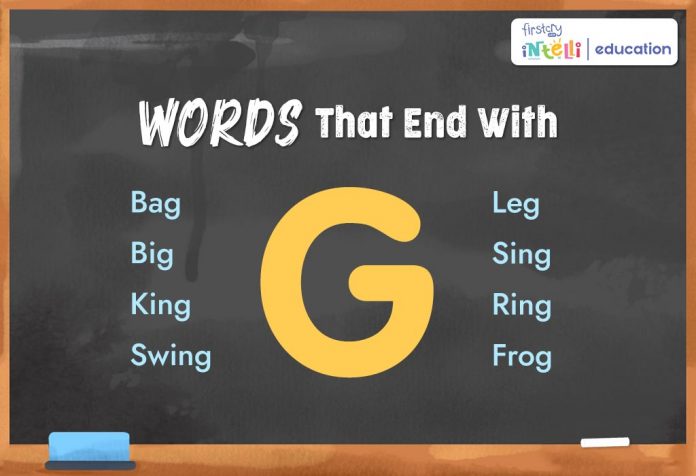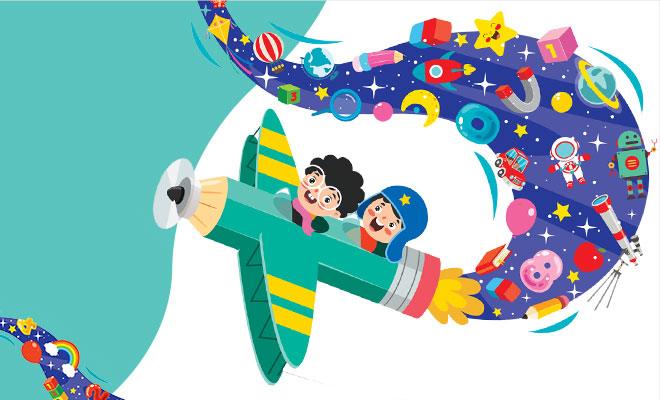Learning words that end with G for preschoolers and kids is a fun and effective way to help young learners build their vocabulary, improve spelling skills, and notice crucial English spelling patterns. Many words that end in G are action words (verbs), describing words (adjectives), or names of everyday objects, making them easy to find in books, conversations, and classroom activities. Focusing on these words helps children develop a better understanding of how spelling and sounds work together in English. Exploring and using words that end with G in games, story writing, word searches, and spelling tests makes learning interactive and enjoyable. These activities not only support reading and writing confidence but also encourage curiosity and a love for language in preschoolers and young kids. By practising with these G-ending words regularly, children strengthen their early literacy skills and become more enthusiastic and capable readers and writers.
List Of Common Words That End With G
Here are some simple and familiar words with G in the end for kids — perfect for practising spelling and building their vocabulary:
Thank you for reading this post, don't forget to subscribe!
| Bag | King | Swing |
| Big | Leg | Being |
| Sing | Plug | Along |
| Wag | Ring | Young |
| Dog | Frog | Going |
| Pig | Wing | Cling |
| Mug | Song | Wrong |
| Rag | Hang | Spring |
| Dig | Ping | String |
| Log | Bang | During |
| Jog | Ding | Fixing |
| Hug | Gong | Caring |
| Bug | Bring | Ending |
| Zig | Thing | Making |
| Flog | Sling | Digging |
3 Letter Words Ending In G
Learning a three-letter word ending with G helps young children practise recognising the “g” sound at the end of words. These short, simple words are perfect for kids to build their spelling and reading skills.
| Bag | Big | Dig |
| Dog | Hug | Rag |
| Pig | Wig | Log |
| Bug | Jog | Sag |
| Wag | Bog | Fig |
- Bag – A container for carrying things.
- Big – Large in size.
- Dig – To make a hole in the ground.
- Dog – A common pet animal that barks.
- Hug – To hold someone closely to show love or comfort.
- Rag – A small piece of cloth used for cleaning.
- Pig – A farm animal that oinks.
- Wig – A covering of artificial hair worn on the head.
- Log – A thick cut piece of tree trunk.
- Bug – A small insect or creature.
- Jog – To run slowly or steadily.
- Sag – To sink or droop downward.
- Wag – To move from side to side, like a dog’s tail.
- Bog – A wet, muddy area of land.
- Fig – A sweet fruit that grows on trees.
4 Letter Words That End With G
Learning short words that end with G helps kids practise spelling and recognise common word endings. These simple four-letter word ending in G are easy and fun for early readers to use in sentences and games.
| Ring | King | Song |
| Frog | Wing | Plug |
| Hang | Ping | Bang |
| Ding | Long | Snug |
| Gong | Twig | Flag |
- Ring – A small round band, often worn on fingers as jewellery.
- King – A male ruler who leads a country or kingdom.
- Song – Music with words that people sing.
- Frog – A small green animal that jumps and lives near water.
- Wing – The part of a bird or insect used for flying.
- Plug – Something used to close a hole or connect an electrical device.
- Hang – To suspend or put something up so it doesn’t touch the ground.
- Ping – A short, sharp sound, like a bell or alert sound.
- Bang – A loud noise, like a door slamming or an explosion.
- Ding – A small ringing or bell-like sound.
- Long – Measuring a great distance from one end to the other.
- Snug – Warm, comfortable, and fitting closely.
- Gong – A large metal disc that makes a loud ringing sound when hit.
- Twig – A small, thin branch from a tree or bush.
- Flag – A piece of cloth with colours and symbols used to represent a country or group.
5 Letter Words That End With G
Learning five-letter words ending in G is a great way for kids to expand their vocabulary and practise spelling longer words with the common “-ing” ending. These words are fun, easy to recognise, and often appear in everyday reading and speaking.
| Bring | Thing | Swing |
| Going | Along | Young |
| Wrong | Cling | Sprig |
| Fling | Pring | Wring |
- Bring – To carry something to a place.
- Thing – An object or item.
- Swing – To move back and forth.
- Going – Moving or walking.
- Along – Moving beside or with someone or something.
- Young – Not old; having lived only a short time.
- Wrong – Not correct or right.
- Cling – To hold tightly onto something.
- Sprig – A small branch or twig, usually with leaves or flowers.
- Fling – To throw something with force.
- Pring – (Less common; can be omitted if preferred)
- Wring – To twist and squeeze, usually to get water out.
6 Letter Words That End In G
Here are some common words that end with the letter G, which have six letters. These words help children practise spelling longer words ending in G, boosting their vocabulary and reading confidence.
| Asking | Laying | Strong |
| Spring | string | During |
| Riding | Caring | Ending |
| Making | Fixing | Eating |
- Asking – To request information or something politely.
- Laying – Putting something down carefully.
- Strong – Having a lot of power or strength.
- Spring – The season after winter, or to jump suddenly.
- String – A thin piece of material used for tying or hanging things.
- During – Happening in the time of something else.
- Riding – Sitting on and controlling something like a bike or horse.
- Caring – Showing kindness and concern for others.
- Ending – The last part of something.
- Making – Creating or producing something.
- Fixing – Repairing something that is broken.
- Eating – Putting food into the mouth and swallowing it.
Nouns That End With G
Nouns are words that name people, places, animals, or things. Here are some common English words ending in G that are nouns, perfect for kids to practise reading, spelling, and learning new words.
| Bag | King | Ring |
| Frog | Wing | Song |
| Plug | Hang | Ping |
| Bang | Ding | Gong |
| Twig | Flag | Spring |
| Filing | Molding | Bedding |
| Parking | Building | Greeting |
| Painting | Pudding | Meeting |
- Bag – A container used to carry things.
- King – A male ruler of a country.
- Ring – A small round piece of jewellery worn on fingers.
- Frog – A small green animal that jumps and lives near water.
- Wing – The part of a bird or insect used for flying.
- Song – Music with words people sing.
- Plug – An object used to close a hole or connect electrical devices.
- Hang – The act or place of suspending something.
- Ping – A short, sharp sound or signal.
- Bang – A loud noise like a door slamming.
- Ding – A soft ringing sound.
- Gong – A metal disc that rings loudly when struck.
- Twig – A small branch from a tree.
- Flag – A piece of fabric with colors representing a country or group.
- Spring – The season after winter or a coil that bounces.
- Filing – A collection of papers or documents kept together.
- Molding – Decorative trim used in building or furniture.
- Bedding – Sheets and blankets used on a bed.
- Parking – A place or act of leaving a vehicle temporarily.
- Building – A structure with walls and a roof.
- Greeting – A friendly word or action to welcome someone.
- Painting – A picture created using paint.
- Pudding – A soft, often sweet, food usually eaten as dessert.
- Meeting – When people come together to talk or make decisions.
Verbs Ending With G
Verbs are action words—they describe what someone or something does. Here are some common verbs ending with G that are simple, easy to use, and fun for kids to learn and practise:
| Bring | Hang | Sing |
| Ping | Bang | Plug |
| Ring | Jog | Drag |
| Sling | Swing | Cling |
- Bring – To carry or take something to another place.
- Hang – To suspend something so it does not touch the ground.
- Sing – To make music with your voice.
- Ping – To make a short, sharp ringing sound or to send a quick electronic signal.
- Bang – To hit something hard, making a loud noise.
- Plug – To close a hole or connect a device to a power socket.
- Ring – To make a bell-like sound or to call someone by phone.
- Jog – To run slowly and steadily, usually for exercise.
- Drag – To pull something along the ground or another surface with effort.
- Sling – To throw or hang something loosely.
- Swing – To move back and forth, like on a playground swing.
- Cling – To hold tightly onto something or someone.
Adjectives That End With G
Adjectives are describing words that tell us more about people, places, or things. Here are some common and simple adjectives that end with G to help kids expand their vocabulary and make their sentences more interesting.
| Big | Long | Young |
| Strong | Wrong | Snug |
| Glowing | Charming | Boring |
| Amazing | Exciting | Tiring |
- Big – Large in size.
- Long – Measuring a great distance from one end to another.
- Young – Not old; having lived only a short time.
- Strong – Having great power or strength.
- Wrong – Not correct or right.
- Snug – Warm, comfortable, and fitting closely.
- Glowing – Giving off light or warmth.
- Charming – Very pleasant or attractive.
- Boring – Not interesting or fun.
- Amazing – Very surprising or wonderful.
- Exciting – Causing a lot of happiness and interest.
- Tiring – Making you feel you need to rest.
Adverbs That End With G
Although adverbs commonly end with “-ly,” there are also some important and useful adverbs ending with G in English. These adverbs describe how, when, or where something happens and are great for expanding vocabulary in young learners.
| Along | Long | Wrong |
| Headlong | Daylong | Incoming |
| Lifelong | Sidelong | Adjoining |
| Ongoing | Outgoing |
- Along – Moving in a line or path; going together with someone or something (e.g., “Come along with us!”).
- Long – For a great amount of time or distance (e.g., “She waited long for her friend”).
- Wrong – In a way that is not correct or right (e.g., “You spelled that word wrong”).
- Headlong – Moving very fast and without careful thought, often straight forward (e.g., “He ran headlong into the room”).
- Daylong – Lasting for the whole day (e.g., “It rained daylong yesterday”).
- Incoming – Coming in or arriving (e.g., “Incoming flights are delayed”).
- Lifelong – Lasting throughout a person’s whole life (e.g., “They are lifelong friends”).
- Sidelong – To the side; looking or moving sideways (e.g., “She gave him a sidelong glance”).
- Adjoining – Next to or joined with something else (used mostly as an adjective, but can describe closeness) (e.g., “The building adjoining the school is a library”).
- Ongoing – Happening now and continuing (e.g., “The ongoing project will finish next month”).
- Outgoing – Going out; also used to describe a friendly and sociable person (e.g., “The outgoing mail leaves at noon” or “She is very outgoing”).
Words That End With G Chart
Below is a table with a variety of common words that end with the letter G. These include short words, nouns, verbs, adjectives, and adverbs to support vocabulary building and spelling practice.

FAQs
1. What is the origin of the “-ing” ending in English words?
The “-ing” ending comes from Old English and has been used for hundreds of years to form the present participle and gerund. It turns verbs into words describing ongoing actions or the act of doing something (like “singing” or “writing”).
2. Are there any silent Gs at the end of English words?
No, in standard English, the letter G at the end of a word is always pronounced. However, English does have words with a silent G at the start, such as “gnaw” or “gnome,” but not at the end.
3. Are there any common confusions with the letter G at the end of words?
Yes, sometimes learners confuse the pronunciation of words ending in “-ng” because the “ng” sound can be tricky. In words like “sing” or “ring,” the “ng” forms a single nasal sound, which is different from pronouncing the “g” separately as in “finger.”
4. How does the letter G affect word formation in English?
The letter G at the end of words often appears in verb forms with “-ing,” which can change the tense or function of the word (like from “run” to “running”). It can also be part of noun forms (like “king”) and adjectives (like “strong”), showing that G helps create different parts of speech and meanings.
Learning words that end with G helps preschoolers and kids build vocabulary, improve spelling, and understand English word patterns. These words include verbs, nouns, adjectives, and some adverbs. Practising them with fun activities makes reading and writing easier and more enjoyable. Keep exploring these words every day to grow language skills!
Also Read:
| Words that Ends with A | Words that Ends with B | Words that Ends with C |
| Words that Ends with D | Words that Ends with E | Words that Ends with F |
| Words that Ends with G |











